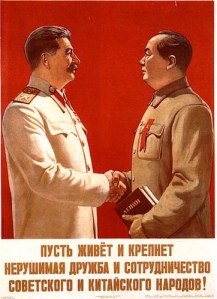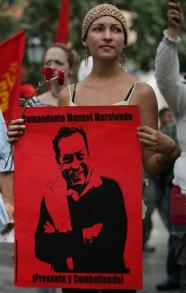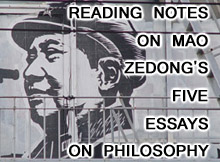
Stalin and Mao
More and more these days, particularly among those calling themselves ‘Maoists’ and ‘post-Maoists’ it is becoming fashionable to go after Stalin and his legacy, to critique ‘Stalinism’ and to talk of ‘going beyond Stalinism’. There seems to go along with this a summation of Stalin that completely negates his successes, or that at least says that his errors were primary and successes were secondary, and that, overall Stalin should be thrown out. I want to seriously engage this trend, from my personal point of view. I’m not an expert, but I’ve read a few books and I’ve had a few discussions with people who have varying summations of Stalin and his contributions to the experience of proletarian revolution. This article, I hope, will only be the beginning of a series of discussions regarding this and related questions.
To begin with, lets get a few things out of the way. First, I do not believe that the question of Stalin is the cardinal question before Marxist-Leninists today. It is not the basis of rebuilding the unity of the Marxist-Leninist movement following the series of splits that occurred after his death and then the death of Mao Zedong. It is an important issue, but the basis of rebuilding unity among Marxist-Leninists should be based on agreement on Marxist-Leninist principles (rather than personalities) and anti-imperialist practice, i.e., proletarian internationalism. A summation of the experiences of the international communist movement is, of course, an integral part of building unity on the basis of principles. The 1999 declaration of the International Communist Seminar goes into this as well: “When parties have different ideological opinions concerning various questions, they can gradually surmount them in a process of common practical struggle against the international bourgeoisie, that strengthens confidence in the noblest ideals of humanity and eliminates all forms of opportunism, liberalism and dogmatism.” Continue reading →
Posted in FRSO, People's Republic of China, Reading Notes, Soviet Union, Theory
Tagged anti-revisionism, CPN-Maoist, CPP, Fang Kang, Hua Guofeng, Khrushchev, Lenin, Ludo Martens, Mao, Maoist Thought, People's Republic of China, political economy, revisionism, Socialism, Soviet Union, Stalin, theory
 The following is from the website of the Communist Party of Great Britain (Marxist-Leninist):
The following is from the website of the Communist Party of Great Britain (Marxist-Leninist):























